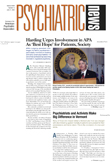Myth: Domestic violence doesn’t exist among same-sex couples. Fact: At least one in four gay and lesbian partners will experience domestic violence in his or her lifetime, according to the 1998 domestic violence report by the National Coalition of Anti-Violence Projects (NCAVP).
Kenneth Noyes, deputy director of the National Coalition Against Domestic Violence in Washington, D.C., is busting myths like this by educating professionals and community organizations about same-sex domestic violence. The coalition includes gay and lesbian issues in all its presentations, said Noyes in an interview.
“Gay and lesbian couples experience the same issues of power and control as heterosexual couples. This may manifest itself in physical, sexual, verbal, and economic abuse,” said Noyes.
Verbal abuse may be expressed as threatening a partner with disclosure of his or her sexual identity or positive HIV status to unknowing friends or family members, said Noyes.
He recalled four friends who faced threats of HIV disclosure if they told anyone about the abuse. “Two finally left the relationships because they confided in friends or family members who already knew about their HIV status and helped them achieve financial independence.”
Sexual abuse occurs in many forms including a partner’s refusal to use “safe sex” practices such as wearing a condom, putting the victim at risk of contracting HIV.
Women Can Be Perpetrators
A major barrier to recognizing abuse in same-sex couples is that domestic violence has traditionally been portrayed as a heterosexual issue with male perpetrators and female victims.
“There’s a strong feeling in the lesbian community that lesbians are not violent, that they’re nurturing, more caring, and incapable of rage. That simply isn’t the case,” said Sharon Shaw Johnson, director of the Los Angeles Gay and Lesbian Anti-Violence Projects. She was quoted in an article by Jane Lowers in the September/October 1995 issue of Curve (formerly Denueve), titled “Rape: When the Assailant Is One of Our Own.”
Studies show that as many as a third of lesbians have been victims of sexual assault or coercion at the hands of another woman. “The fact that few cases are ever reported shows the near complete lack of support for women who have survived a same-sex sexual assault,” according to the article.
Lesbians who report sexual assault or coercion to mainstream domestic violence programs may not be believed, and police may refuse to file a report, according to the article.
To add insult to injury, lesbians who flee an abusive relationship by going to emergency shelters often encounter residents with homophobic attitudes, said Noyes. “Lesbians have reported to victim advocates that they were verbally harassed by other residents.”
Not surprisingly, gay and lesbian victims rarely call 911 or go to shelters if there are other options available, said Noyes.
Special Services
Victim services are provided to gay/lesbian/bisexual/transgender people in large cities including San Francisco, Boston, New York, and Seattle. Among the services are hotlines, support groups, and advocates who navigate the legal and social services systems. Alternatives to emergency shelters are provided, such as vouchers for overnight stays in motels or hotels.
The Community United Against Violence (CUAV) in San Francisco developed the first domestic violence program for gay men in 1986. In 1995 it expanded its services to include lesbians, bisexuals, and transgendered persons.
Multilingual translation services are available to hotline callers from other countries, mainly Asian and Latin American countries, and several staff are also bilingual, according to CUAV’s Web site.
CUAV’s 24-hour support line received 440 domestic violence calls between July 1, 1997, and June 30, 1998. CUAV responded by providing 133 of the callers with face-to-face counseling, 62 with criminal justice assistance, 35 with obtaining restraining orders, and 15 with emergency hotel rooms, according to CUAV’s Web site.
CUAV and the Northwest Network, which offers similar services in Seattle, train health care professionals (including mental health professionals), victim advocates, and law enforcement officials about same-sex survivors of domestic violence to ensure that victims receive assistance.
Domestic Violence Laws
All 50 states and the District of Columbia have laws protecting victims of domestic violence. Judges often have the discretion to go beyond restraining orders and order the abuser to pay for services used by the victim and to provide temporary financial support, according to the 1998 domestic violence report by the NCAVP.
However, state laws use different definitions of “family and household members.” In seven states, the laws explicitly refer to opposite-sex couples, thereby excluding same-sex couples from protection orders. Only Hawaii’s domestic violence law explicitly mentions same-sex couples. However, the courts in three other states (Illinois, Kentucky, and Ohio) interpreted the domestic violence laws in favor of granting protection orders to same-sex victims, according to the 1998 report.
Thirty-seven states have laws written in gender-neutral language that the courts could interpret in favor of same-sex couples, according to the report. Maryland, Mississippi, Florida, and other states have retained sodomy laws that most likely would be interpreted narrowly against same-sex couples or would require the victims to acknowledge an “illegal sexual relationship,” according to the report.
The NCAVP’s 1998 “Annual Report on Lesbian, Gay, Bisexual, Transgender Domestic Violence” with an appendix of NCAVP members is posted on the Web at www.lambda.org/dv97.htm. The executive summary and press release are posted at www.lambda.org/dv97.htm#Press-release. The CUAV Web site is www.cuav.org/dv.htm. The Northwest Network Web site, which features relevant articles under “power tools,” is www.nwnetwork.org. ▪
